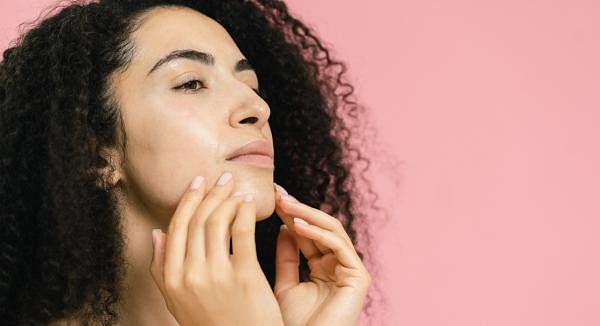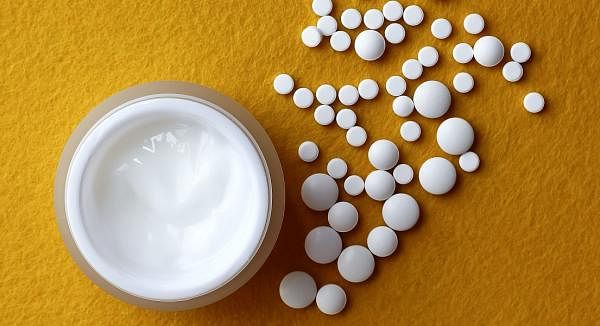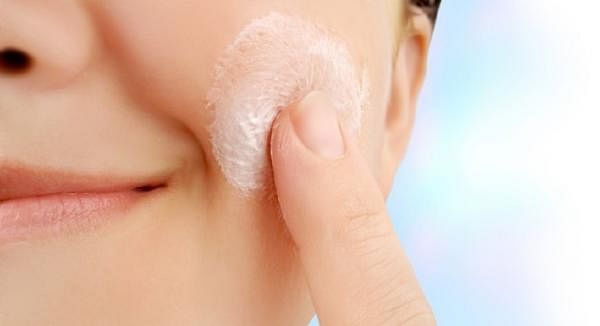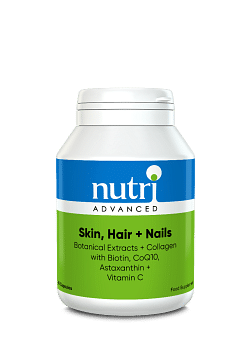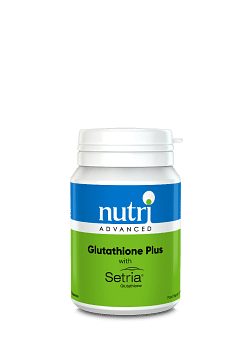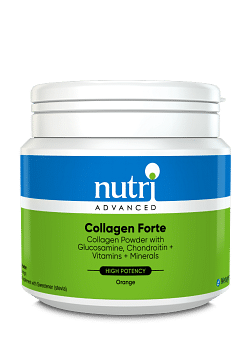What Is Your Skin Telling You About Your Health?
Why you can trust Nutri Advanced Every article on our site is researched thoroughly by our team of highly qualified nutritionists. Find out more about our editorial process.
Our skin is one of our most important organs and the largest too; encompassing a total surface area of around 20 square feet! Not only does our skin perform many crucial functions as a vital organ, but can be an outer reflection of inner health too. Many different problems can affect the skin - it may be too dry or too oily, flaky, super sensitive, prone to breakouts or lacking in tone or elasticity. Chronic problems such as acne, rosacea, eczema and psoriasis are prevalent too. Conventional approaches often rely on topical treatments, whereas a functional medicine approach will seek to restore skin health from the inside out. This involves digging deep to identify and deal with underlying imbalances that may at first glance seem unconnected, but may actually be sitting right at the root of problematic skin. Underlying factors can be different for everyone, even when two people present with the same problem, and the best approach is always a personalised one. There are however some underlying imbalances that come up time and again for skin problems.
So what could your skin be trying to tell you? Let’s take a closer look:
1. Gut health
It will come as no surprise that gut health sits right at the top of this list. Good health starts in the gut and when gastrointestinal health is out of balance, every other aspect of health, including skin, can be affected too. Factors such as digestive insufficiency (e.g. low digestive enzymes or stomach acid), parasites, fungal overgrowth, small intestinal bacterial overgrowth (SIBO), leaky gut, dysbiosis and more can all show up in the skin. This is because gut health influences how we extract and utilise nutrients from our food, inflammatory processes and is a key regulator for the immune system too. The gut microbiota deserves special mention when it comes to skin health because it is now well accepted and widely studied that altered gut microflora play an important role in a wide variety of skin disorders from atopic dermatitis to rosacea, psoriasis, acne vulgaris, dandruff, and even skin cancer.
What you can do:
Comprehensive functional stool testing is an important starting point to identify any imbalances in gut health overall and the gut microbiota. There are many targeted diet, lifestyle and supplement steps you can take to improve gut health and supporting a healthy gut microbiota is absolutely key.
Find out more here:
Gut Transformation Clinical Guide
The Nutri Hour - How To Choose The Best Gut Formula For Your Client With Eloise Bauskis
2. Hormone imbalance
Skin changes are common during puberty, and for females pre-menstrually and during the peri-menopause and menopause transitions. And this certainly gives some clue to the fact that hormonal changes, shifts and imbalances can impact the skin. High levels of androgens can promote excess sebum production and this is known to be an underlying factor involved in acne vulgaris. Women with PCOS (polycystic ovarian syndrome) often have higher levels of androgens and are more likely to suffer from acne. Period-related breakouts are very common in the days leading up to menstruation and whilst the exact reasons for this are not completely understood, it is thought this may in part be due to elevated androgens or an imbalance between oestrogen and progesterone. It is also important to note that oestrogens induce the release of histamine – a chemical produced by the body which promotes swelling, inflammation, redness, hives and rashes so if oestrogens are elevated, you’re likely to get increased histamine output and these associated skin effects too. In fact, oestrogens have many important roles to play in skin health and declining levels can be problematic too, especially during the peri-menopause and menopause transition where common symptoms include skin dryness and loss of tone and elasticity. Stress plays havoc with the skin too, not only due to the effects of adrenal hormones such as cortisol that are produced as part of the stress response, but chronic stress can negatively impact the gut microbiota, disrupt sex hormones and affect blood sugar regulation too. Rosacea is known to be induced or aggravated by emotional stress and it is likely that the brain is involved in cross-talk between the skin and gut microbiota through the gut-brain-skin axis.
What you can do:
As with gut health, functional testing is the ideal first step to understanding whether hormonal imbalance may be sitting at the root of skin problems. Supporting hormone balance through diet, lifestyle and supplement interventions can be tailored specifically to age, sex and current health picture. In our fast-paced world, most people would benefit from supporting a more balanced stress response. Magnesium is often nicknamed nature’s tranquiliser and is a particularly important mineral for supporting balance and calm, yet levels are often low in a typical Western diet. Supplementation in the form of magnesium glycinate may be helpful.
Find out more here:
5 Nutrients To Nourish Your Skin Through Menopausal Transition
What's The Link Between Oestrogen And Histamine?
Functional Medicine Guide To Oestrogen Balance
HPA Dysregulation Support Guide
Clinical Guide Female Health
Menopause Fact Sheet
PMS Fact Sheet
3. Blood sugar imbalance
A diet high in refined carbohydrates and processed convenience foods disrupts blood sugar balance and is bad news for pretty much every aspect of health; not surprising then that it’s associated with poor skin health too. Blood sugar spikes increase insulin-like-growth-factor (IGF-1) which can lead to excess sebum production. Insulin-like-growth factor is also associated with an upregulation in inflammatory cytokines. In a 2021 review published in the International Journal of Dermatology, researchers reviewed the evidence on the effects of diet on acne and they found high GI/GL food to be an acne-promoting factor. And research studies have demonstrated favourable effects of a low glycaemic diet on acne.
What you can do:
There are many diet and lifestyle steps which can help to support blood sugar balance. Key nutrients and ingredients include chromium, alpha lipoic acid and cinnamon. Myo-inositol is a ‘vitamin-like’ substance produced in the human body and can also be taken in supplement form. Myo-inositol is a key factor involved in insulin signalling and low levels have been observed in individuals with impaired insulin sensitivity and PCOS. In fact, a number of research studies have found supplemental myo-inositol to be an effective support in PCOS, in part due to its ability to improve insulin sensitivity, restore hormonal balance and reduce hyperandrogenism.
Find out more here:
Natural Support For Blood Sugar Balance
Benefits Of Myo-Inositol For PCOS
4. Suboptimal nutrient intake
Just like any other bodily organ or system, our skin relies on a regular supply of essential nutrients for it to stay healthy and perform its many vital functions. Vitamin A plays an essential role in skin health; low levels of vitamin A can negatively impact sebum production and some of the earliest signs of deficiency include dry skin, dry hair and broken fingernails. In fact, retinol (the form of vitamin A found in animal foods) is commonly included in topical treatments for acne. Zinc intakes are commonly low in a typical Western diet and yet zinc is vital for skin healing and repair, and to support immune function and hormone balance. Zinc may also help to keep sebum production balanced. Regular intake of Vitamin C is essential to support collagen and elastin production – vital structural proteins in the skin and levels of which tend to decline naturally as we age. Vitamin C also has strong antioxidant activity which can help to protect the skin against both internal and external damage. Omega-3 fats EPA & DHA provide vital support for healthy skin. A subcutaneous layer of fat cells sits underneath the dermis (the middle layer of skin), and this adds extra cushioning, protection and helps to support hydration. It’s the range of beneficial fats in your diet that will feed this layer, hence why low fat diets are bad news for your skin. Omega-3 fats also helps to keep inflammation in check. Omega-3 fats are found in nuts, seeds and oily fish such as salmon, mackerel and herring, and are often lacking in a typical Western diet. A daily omega-3 fish oil supplement helps to ensure you are regularly getting enough of these nourishing fats to support your skin.
What you can do:
Add a high quality multivitamin & mineral supplement and an omega-3 supplement into your daily routine. You can also take collagen in supplement form for extra support for this important structural protein in your skin.
Find out more here:
5 Things You Need To Know About Collagen
The Science Behind Younger Looking Skin
The Vital Ways Our Protective Skin Barrier Supports Our Health
5. Toxins and oxidative stress:
Skin is highly vulnerable to damage from external (UV rays, extreme heat or cold, non-natural cosmetics and toiletries, smoky atmospheres etc.) and internal (toxins, oxidative stress etc.) factors. It is vitally important therefore to ensure that the body’s antioxidant and detoxification systems are well supported to deal with this. Glutathione is often nicknamed the ‘master antioxidant’ and is produced by the body in response to oxidative stress. Supporting glutathione is a vitally important step to help protect your skin against damage.
What you can do:
Your body needs regular and adequate supply of the ingredients needed to make glutathione: cysteine, glycine and glutamic acid. Cysteine is often regarded as the rate-limiting step and a daily supplement of N-acetyl-L-cysteine is often recommended to ensure glutathione production is supported. You can also take glutathione in supplement form; this works well with green tea, turmeric, selenium, alpha lipoic acid and milk thistle. Milk thistle has a long history of traditional use in supporting the liver.
Find out more here:
Glutathione: Effects Of 21st Century Diet And Lifestyle – Jo Gamble Webinar
How To Effectively Support Optimal Glutathione Levels
Work from the inside out to support healthy skin
When skin problems arise it can be tempting to opt for the latest wonder cream that promises to solve them overnight. Sadly, this rarely happens and skin issues are more often rooted much deeper beneath the surface. As you can see, there are a variety of factors that may commonly affect skin health, and the most effective approach is the one where these are correctly identified and targeted. And if you start by seeking to understand what your skin is trying to tell you rather than simply suppressing symptoms, the massive upshot is that your wider health will also benefit as a result.
This website and its content is copyright of Nutri Advanced ©. All rights reserved. See our terms & conditions for more detail.
Nutri Advanced has a thorough research process and for any references included, each source is scrutinised beforehand. We aim to use the highest value source where possible, referencing peer-reviewed journals and official guidelines in the first instance before alternatives. You can learn more about how we ensure our content is accurate at time of publication on our editorial policy.
Most Popular Articles
-
7 Surprising Ways To Support Your Magnesium
If you are displaying signs of a magnesium deficiency, here are 7 ways to boost your magnesium levels that are easy to incorporate into your daily life. -
5 Best Vitamin C Supplements Picked By Our Experts
Learn more about the different types of vitamin C, the different benefits you get from different types, and what you get for spending more on a good supplement. -
Top 5 Vitamins For Energy And Tiredness Picked By Our Experts
The 5 best and most important vitamins for energy & tiredness including B vitamin food sources & best supplement forms for energy. -
Benefits of Myo-Inositol for Polycystic Ovary Syndrome (PCOS)
In this research review article, we take a closer look at a lesser-known natural compound called myo-inositol that has been found to have significant potential to improve many of the prevalent features of PCOS. -
Top 10 Reasons to Give Your Kids Omega-3
Read the top 10 reasons that kids should have plenty of Omega-3- an essential fatty acid- including for depression, brain function, sleep & reading/maths skills.





